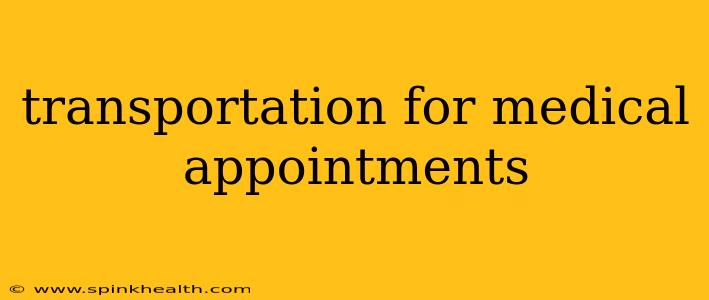Navigating the Road to Healthcare: Finding Transportation for Medical Appointments
The journey to better health sometimes begins with the journey to the doctor's office. Securing reliable transportation for medical appointments can be a significant hurdle, especially for individuals facing mobility challenges, lack of personal vehicles, or financial constraints. This isn't just about getting from point A to point B; it's about accessing crucial healthcare and improving overall well-being. Let's explore the various options available and navigate this often-overlooked aspect of healthcare access.
My name is Sarah, and I've spent years working in healthcare administration, witnessing firsthand the struggles patients face in getting to their appointments. This post draws on my experiences and research to provide a comprehensive guide to finding reliable transportation solutions.
What are some transportation options for medical appointments?
This is a multifaceted question with answers tailored to individual circumstances. The best option depends on factors like distance, budget, and personal mobility. Let's examine several common solutions:
-
Personal Vehicle: The most straightforward option, if you have access to a car and are capable of driving. However, driving to appointments can be challenging if you're recovering from an illness or injury, or if you need assistance getting in and out of the vehicle.
-
Ride-Sharing Services (Uber/Lyft): Convenient and widely available, these services offer flexibility and can be booked on demand. However, costs can add up, particularly for frequent appointments.
-
Public Transportation (Buses/Trains/Subways): Often the most affordable option, but can be time-consuming and less convenient, especially for individuals with limited mobility or those needing assistance with luggage or medical equipment. Accessibility features vary depending on the system.
-
Taxi Services: A reliable option, though generally more expensive than ride-sharing services.
-
Medical Transportation Services: Specifically designed for patients needing assistance getting to and from medical appointments. These services often cater to individuals with disabilities or those requiring specialized equipment. They may require prior scheduling and may be covered by insurance in some cases.
-
Friends and Family: Relying on loved ones for transportation can be beneficial, but it's crucial to consider their availability and the potential burden on their time.
How can I find affordable transportation to medical appointments?
Affordability is a major concern for many seeking medical transportation. Several strategies can help:
-
Check with your insurance provider: Many insurance plans offer coverage or reimbursement for medical transportation services. Contact your insurer to inquire about available programs and eligibility requirements.
-
Explore local community resources: Many communities offer subsidized transportation programs for low-income individuals or seniors. Contact your local health department or social services agency for information on these programs.
-
Look into volunteer driver programs: Several non-profit organizations provide volunteer driver services to individuals needing transportation to medical appointments. These services are typically free or offered at a reduced cost.
-
Negotiate with ride-sharing services: Inquire about discounted rates or explore options like ride-sharing pools to reduce the overall cost.
What if I need specialized transportation for a medical appointment?
For individuals with mobility challenges or requiring specialized medical equipment, specialized transportation is crucial. Options include:
-
Wheelchair accessible vehicles: Many taxi and ride-sharing services offer wheelchair-accessible vehicles, but it's always best to book in advance to ensure availability.
-
Ambulance services: In emergency situations or for individuals requiring advanced medical care during transport, ambulance services are a vital option.
-
Non-emergency medical transportation (NEMT): Specialized services dedicated to transporting patients who require assistance, such as those using wheelchairs or other mobility devices.
How do I schedule medical transportation in advance?
Scheduling transportation in advance is essential, especially for specialized services or appointments at specific times. Contact your chosen transportation provider well in advance to secure a ride and avoid potential delays. Be sure to provide all necessary information, including your pickup and drop-off locations, appointment time, and any special needs or requirements.
Navigating the complexities of medical transportation requires planning and research. However, with the information above and a little effort, you can find a reliable and suitable solution for your needs, ensuring a smoother path to accessing the healthcare you deserve. Remember to always confirm availability and costs beforehand. Your health journey shouldn't be hindered by transportation issues.

